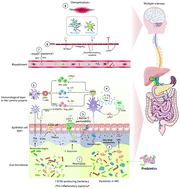Jinchi Jiang,‡a Chuanqi Chu,‡a Caie Wu,b Chen Wang,ac Chengcheng Zhang,ac Tiantian Li,ac Qixiao Zhai,  acd Leilei Yu,*ac Fengwei Tian
acd Leilei Yu,*ac Fengwei Tian  *ac and Wei Chen
*ac and Wei Chen  acef
acef
Abstract
Preliminary evidence shows the potential role of probiotics in ameliorating multiple sclerosis (MS); however, the effects of probiotics on MS remain unclear. Therefore, the aim of this study was to evaluate the efficacy of probiotics on multiple sclerosis by systematically reviewing the preclinical trials (animal trials) and performing meta-analysis of randomized controlled trials. PubMed, Web of Science, Cochrane central of randomized clinical trials, EMBASE, Clinical Trials, and a search engine Google Scholar were systematically searched and manually screened updated to November 2020, resulting in eligible 3 randomized controlled trials (RCTs) and 22 preclinical studies.
Meta-analysis of RCTs enrolling 173 patients with MS receiving probiotics revealed significant beneficial effects of probiotic supplementation on mental health (expanded disability status scale scores: standardized mean difference [SMD] = −1.22; I2 = 92%; 95% CI, −2.40 to −0.03, P = 0.04; Beck depression inventory total scores: SMD = −1.58; I2 = 94%; 95% CI, −3.03 to −0.12; P = 0.03; general health questionnaire scores: SMD = −0.71; I2 = 0%; 95% CI, −1.02 to −0.40; P < 0.00001; depression anxiety and stress scale scores: SMD = −0.72; I2 = 0%; 95% CI, −1.12 to −0.33; P = 0.0003), with very low certainty of evidence.
In addition, probiotic intake markedly improved insulin resistance and inflammatory and oxidative stress markers. Preclinical studies have shown that probiotic consumption reduces the incidence and severity of MS, delays MS progression (15 studies), and improves motor impairment (3 studies) with favorable alterations of immune and inflammatory markers (20 studies) and intestinal microbiome compositions (4 studies) in MS.
These results indicated that probiotics may have beneficial effects on the prevention and treatment of multiple sclerosis.



